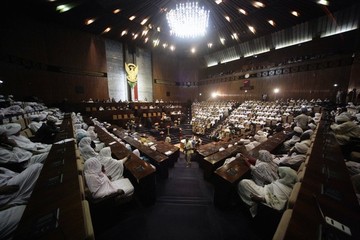Sudan reveals $48.2m in assets frozen under US sanctions
February 24, 2014 (KHARTOUM) – Sudan’s ministry of foreign affairs has disclosed that Sudanese financial assets amounting to $48.2 million are frozen in the United States under decade-long sanctions imposed by Washington on Khartoum.

He further said that Washington imposed penalties and intimidated states, banks, and financial institutions dealing with Sudan.
Several MP’s warned the government against confronting the international community, urging it to review its foreign policy and avoid hasty decisions.
They also called for changing the current approach for dialogue with US through selecting acceptable figure to lead the negotiations with Washington.
MP Abdalla Ali Masar called for using popular means of pressure such as holding banners in front of the White House, demanding that the government seek to achieve national interests.
MP Abdel-Ra’uf Babiker for his part urged the government to change its political rhetoric, criticizing its support for Iran and Palestine.
“Our sons should have the priority over the children of Gaza strip. The people in Kordofan are in need for a sip of water”, Babiker said.
He further underscored the need to stop gum Arabic exports for two years in order to make the whole world “bow” and stressed that the fifth column within the country is spreading rumors that stopping gum Arabic exports would negatively impact the economy, saying those claims are incorrect.
Babiker also pointed that 3 companies owned by the National Intelligence and Security Services (NISS) continue to export gum Arabic in violation of a presidential decree.
Earlier this month, the secretary general of Gum Arabic Council (GAC), Abdel-Magid Abdel-Gadir, disclosed that Sudan exported 42 tonnes of gum Arabic to the United States in 2013 yielding $103 million.
Sudan has been on the US blacklist of states sponsoring terrorism since 1993 on allegations of harboring Islamist militants despite reports of Sudan being a cooperative intelligence partner of Washington in the “war on terror”.
Sudan is also subject to comprehensive economic sanctions since 1997 over terrorism charges as well as human right abuses. Further sanctions, particularly on weapons, have been imposed since the 2003 outbreak of violence in the western Darfur region.
In 2010 however, the US announced it was easing sanctions on agriculture equipment and services which allowed half a dozen companies to obtain export licenses.
Last August, Sudan’s former foreign ministry undersecretary, Rahmatallah Mohamed Osman, said that US economic sanctions on Sudan contain some loopholes which could be exploited to boost the economy.
(ST)
